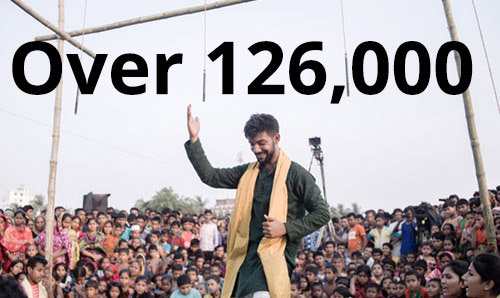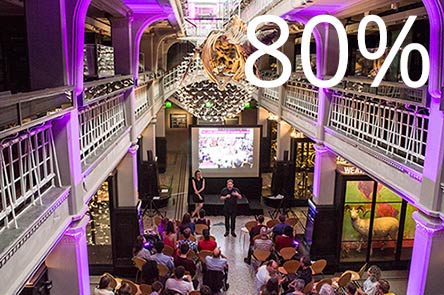
The Lived Experience of Climate Change: A Story of One Piece of Land in Dhaka
This project builds awareness and action on the ‘everyday’ realities and impact of climate change on the lives of low-income people in Dhaka through interactive theatre performances, documentary film, educational programmes, and public events.

As part of her research on urban climate change resilience, Dr Joanne Jordan spent months in an informal settlement in Dhaka talking to over 600 people in their homes, work places, local teashops, and on street corners to understand how climate change is linked to or creating problems in their ‘everyday’ lives and how they are trying to find solutions to those problems.
With the research complete, she teamed up with the Department of Theatre and Performance Studies at the University of Dhaka to explore the findings through a ‘Pot Gan’, a traditional folk medium that combines melody, drama, pictures and dancing. The Pot Gan is not a static piece of theatre; it is an interactive event that challenges the audience to actively engage with the personal experiences of informal dwellers affected by climate change.
Performances of ‘The Lived Experience of Climate Change: A Story of One Piece of Land in Dhaka’ have been seen online and in-person by over 7,000 people, including: informal dwellers, policy makers, practitioners, academics, students, and key publics. Live performances have taken place in Dhaka at:
- The 10th International Conference on Community-based Adaptation to Climate Change, Independent University Bangladesh, Dhaka (25 April 2016)
- British Council Bangladesh, Dhaka (28 April 2016)
- Within the informal settlement that provided the insights for the research in Dhaka (29 April 2016)
The panel were impressed by the strength of personal commitment animating the project and the powerful personal responses encouraged in the participants through the use of the Pot Gan theatrical medium
NCCPE Judges’ panel comment / 2016
To bring the stories from the Dhaka informal dwellers to an even larger international and national audience, the Pot Gan performances were filmed to produce a documentary exploring Dr Joanne Jordan’s findings on the ‘everyday’ realities of climate change in 2016. The documentary ‘The Lived Experience of Climate Change: A Story of One Piece of Land in Dhaka’ was produced and directed by Green Ink, a Dhaka based new media studio specialising in documentaries.
To accompany the documentary, a mini film series ‘Living on the Frontlines of Climate Change’ was launched in summer 2018. In this, informal dwellers from the project field site directly convey their own stories and experiences.
Via educational programmes, the project engaged with students based in Bangladesh, the UK, and Ireland. The project worked with the University of Dhaka to integrate the performance theatre project into their MA programme, whilst also developing teaching resources for Secondary school Geography teachers in the UK and Ireland, using video outputs from the project as teaching resources for MSc programmes at the University of Manchester, and working with Year 13 BTEC Performing Arts students from Regent’s High School in London to re-enact key scenes from the theatre performance in public events in the UK.
Read more about the engagement activities and impact in the project report:
Key achievements
- Winner of the Elsevier and the US-UK Fulbright Commission Researchers' Choice Communication Award.
- Winner of the Arts and Humanities Research Council’s Research in Film Awards 2017 – International Development Award: Mobilising Global Voices (Out of 200 applications).
- Winner of The University of Manchester Making a Difference Awards 2017 for outstanding public engagement initiative (Out of over 130 applications).
- Project was a 2016 Engage Finalist in a national public engagement competition run by the National Co-coordinating Centre for Public Engagement (Out of over 180 applications).
- Over 126,000 people have viewed the project documentary, trailer, or Pot Gan performance video online since it was released in September 2016. Despite 86% of respondents having expertise in climate change and/or development, the survey found that 82% reported learning something new or that it changed the way that they think about climate change as a result of watching the video(s).
- Three live Pot Gan performances in Dhaka were viewed online and in-person by over 7,000 people, including: informal dwellers, policy makers, practitioners, academics, students, and key publics. Despite 89% of respondents having expertise in climate change and/or development, 83% said they had learned something new about climate change or that it changed the way that they think about climate change as a result of viewing the Pot Gan.
- Accompanied by high-profile events, such as a public event on ‘The Lived Experience of Climate Change’ at Rich Mix London, attended by over 200 people (2 February 2017) and the premiere of the project documentary as part of Manchester Museum’s Climate Control exhibition (24 August 2016), attended by a capacity audience of 100 people. Almost 70% of respondents at Rich Mix and over 85% at Manchester Museum reported learning something new about climate change or that it changed the way that they think about climate change as a result of attending the event. 64% of the audience that attended the Rich Mix event said that they care more about climate change as a result of attending the event.
- The Pot Gan was developed as part of a Master’s course unit on ‘Theatre for Development’ at the University of Dhaka, helping Bangladeshi students learn about crucial global issues that have a local impact
- Developed Key Stage 3 Geography teaching resources on ‘Climate Change in Urban Areas: Bangladesh Case study’ to give secondary school teachers support to teach pupils about climate change, and help young people develop the knowledge and skills to think critically about climate change in an urbanising world.
- The project materials have been used as teaching resources at the University of Manchester
- 6 newspaper or magazine articles (print and online) and 17 blogs have been written on the project with a readership of over 29,000.
- Established new partnerships with organisations based in Bangladesh and the UK, including: University of Dhaka; Brick Lane Circle; Theatre of Debate; Tie-Dye Drama; Manchester Museum; Green Ink; Regent’s High School; Rich Mix; and the British Council Bangladesh.

Videos
The Documentary – The Lived Experience of Climate Change
The Pot Gan Performance
Audience Viewpoint of the Pot Gan
- Reactions at the International Conference on Community-Based Adaptation to Climate Change
- Reactions at the British Council Bangladesh
- Reactions at Duaripara informal settlement
Mini Film Series – Living on the Frontlines of Climate Change
- Living on the Frontlines of Climate Change: A Migrant’s Story
- Living on the Frontlines of Climate Change: A Rickshaw Wallah’s Story
- Living on the Frontlines of Climate Change: A Mother’s Story
Expert Viewpoint
- Climate Change in Bangladesh (Dr Saleemul Huq, ICCCAD)
- Climate Change in Urban Areas (Dr David Satterthwaite, IIED)
- Climate Change Communication (Richard Lace, BBC Media Action)
Reports
Project Engagement and Impact Report
Teaching Resources
Key Stage 3 Geography Teaching Resources
Blog Posts/Newspaper or Magazine Articles
Opinion Article in Thomson Reuters Foundation News
Newspaper Article in Dhaka Tribune
- Climate Change Research based on Dhaka Slum featured in ‘Pot Gan’ and Documentary
Teach SDGs Blog Post
Interview with AHRC
Interview with NCCPE
Global Development Institute Blog Posts
- Reflections on an Embedded Approach to Research with Impact
- Innovative New Research reveals the Lived Experience of Climate Change in Dhaka through a Pot Gan Performance of ‘Jol-duari’
Interview in University of Manchester’s Addressing Global Inequalities
Play Booklet with Script
Photo Gallery
- Dhaka Community Pot Gan performance
- #CBA10 Pot Gan performance
- British Council Pot Gan performance
- Documentary screening at the Manchester Museum
- Public event on 'The Lived Experience of Climate Change', Rich Mix London
Events
- The Manchester Museum's Climate Control exhibition (24 August 2016)
- Public event on ‘Climate Change and its impacts on Bangladesh’ Rich Mix, London (2 February 2017)
Social Media
Key People
This work is being led by Dr Joanne Jordan. It is funded by the Royal Geographical Society (with IBG) with an Environment and Sustainability Research Grant (Grant ESRG 6/15), the Arts and Humanities Research Council’s Research in Film Award, and several grants from The University of Manchester, including: Faculty of Humanities Strategic Investment Research Fund, Social Responsibility Research Stimulation Fund, Research and Impact Stimulation Fund and Higher Education Innovation Fund: Eco-voucher award.
- Dr Joanne Jordan
- Email: joanne.jordan@manchester.ac.uk
- Twitter: @JoanneCJordan
